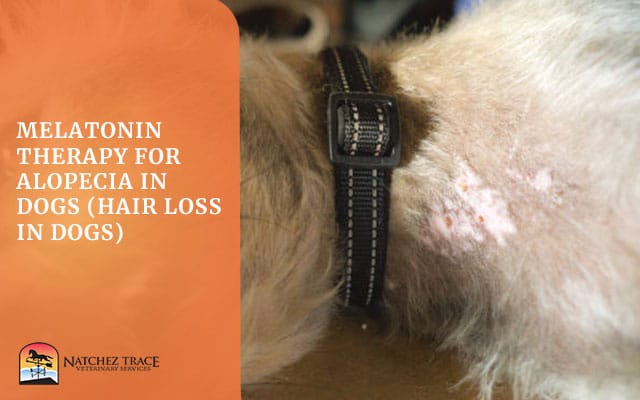Veterinarians and pet owners alike experience success using melatonin for dog alopecia (hair loss in dogs)
The most common form of alopecia for dogs is seasonal alopecia, also called cyclic follicular dysplasia.
This condition is denoted by the hair loss on a dog’s flanks and back. Hair loss can also occur on the base of the tail, nose, and ears.
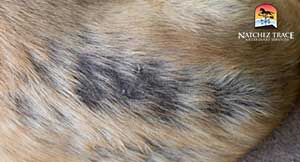 Usually, the skin becomes darker in the areas where the hair loss has occurred, and the dog’s hair will become dry and coarse.
Usually, the skin becomes darker in the areas where the hair loss has occurred, and the dog’s hair will become dry and coarse.
Some breeds of dogs are more likely to be affected by dog alopecia than others.
Bulldogs, boxers, schnauzers, Airedales, labradors, Scottish terriers, Akitas, and Doberman pinschers are more susceptible than other breeds.
Dog alopecia usually starts in early spring or late fall and lasts up to six months, with the dog’s hair typically growing back in afterward.
Sometimes dog alopecia recurs year after year, and sometimes it only occurs once in the dog’s lifetime.
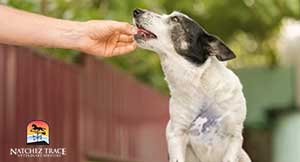 Because many dogs become affected by seasonal alopecia in the spring, researchers have concluded that lack of sunlight may be a cause. Melatonin is our top choice for helping dogs with alopecia.
Because many dogs become affected by seasonal alopecia in the spring, researchers have concluded that lack of sunlight may be a cause. Melatonin is our top choice for helping dogs with alopecia.
Melatonin also helps dogs grow hair back more quickly after surgery. It’s also a fantastic supplement for helping dogs suffering from Cushing’s disease grow their hair back.
Melatonin is a hormone the pineal gland produces that helps regulate hormones and the body’s circadian rhythm.
It is used in veterinary medicine as a natural treatment for coat loss in dogs, cats, and ferrets. Researchers are not exactly sure how melatonin helps thicken and regrow fur.
Some researchers think it may be the relationship between melatonin, sunlight, and the body’s circadian rhythm. Others feel that melatonin’s antioxidant properties help promote hair growth.
Melatonin has also been shown to help a pet gain back weight after surgery, stress, or illness and help with anxiety, insomnia, and noise phobias. Mink farmers have been known to use melatonin to promote thick coats in the winter.
Furthermore, melatonin is also believed to act as an antioxidant. It reduces free radical damage, stimulates an aging immune system, protects the cardiovascular system, preserves a youthful circadian rhythm; and stimulates the production of growth hormone. Oral melatonin supplementation has been found to be effective for hair regrowth in 50-75% of these cases of cyclic flank alopecia. It should be administered in the evening, due to the natural sedating effects. -Geneva’s Pomeranians: Alopecia
Recommended Supplementation of Melationin for Dog Alopecia
Research recommends not exceeding a dosage of 3 to 6 mg every 8 to 12 hours when using melatonin for dog alopecia.
A general guideline for dosing melatonin is:
 Dogs under 10 lbs – 1 mg of melatonin every 12 hours (also for those who want to give their dogs very low doses of melatonin)
Dogs under 10 lbs – 1 mg of melatonin every 12 hours (also for those who want to give their dogs very low doses of melatonin)- Dogs under 30 lbs – 3 mg of melatonin every 12 hours
- Dogs over 30 lbs – 6 mg of melatonin every 12 hours
- Note: Research recommends not exceeding a melatonin dosage of 3 to 6 mg every 8 to 12 hours.
- Note: Make sure you read the label and give your dog supplements containing melatonin only. Colorings and additives may be toxic to your dog.
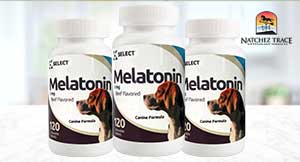 Note: If melatonin makes your dog excessively sleepy, give melatonin only at night.
Note: If melatonin makes your dog excessively sleepy, give melatonin only at night.
Our top choice of melatonin for dog alopecia is K9 Select Beef-Flavored Melatonin Supplement For Dogs. It comes in a tasty chew that can be given as a treat, with appropriate dosing on the label.
This dose can be given once or twice daily. If given once daily, the recommendation is to dose in the evening.
Note: If you’re not using K9 Select Beef-Flavored Melatonin Supplement For Dogs, make sure you read the label and give your dog supplements containing melatonin only. Colorings and additives may be toxic to your dog. Please remember, though, that every pet is different and it is always best to consult with your veterinarian for the best possible dosage for your pet’s individual situation. Adjustments may need to be made for particular health situations and/or medications.
Side Effects: There have been no reports of significant side effects of melatonin use in dogs. There have been a few reports of minor gastric upset and sleepiness. Melatonin has been shown to slightly alter the time an un-spayed female comes into heat. Melatonin may also interact with corticosteroids and some internal body process. Melatonin is not recommended for use in breeding dogs because it has been shown to sometimes alter mating desire and when a dog comes into heat.
Signs of Overdosage: It is very important not to exceed the recommended amount of melatonin.
Be very careful when choosing your melatonin product. Many of the melatonin products sold for humans are much stronger than the recommended amount for dogs.
Signs of over dosage include diarrhea, vomiting, high blood pressure, incoordination, and even possibly seizures.
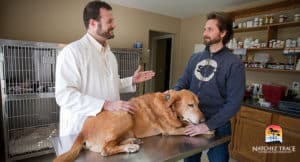 Note: It is always best to consult with your veterinarian before concluding that your pet has a particular ailment. In the case of Canine Alopecia, you should make sure that your veterinarian rules out thyroid disease, Cushing’s disease, parasites, mites, and certain bacteria. All of these can cause symptoms similar to Canine Seasonal Alopecia. To test for thyroid or Cushing’s disease, your veterinarian will need to perform a blood test; for parasites, mites and certain bacterias, a skin sample may need to be taken.
Note: It is always best to consult with your veterinarian before concluding that your pet has a particular ailment. In the case of Canine Alopecia, you should make sure that your veterinarian rules out thyroid disease, Cushing’s disease, parasites, mites, and certain bacteria. All of these can cause symptoms similar to Canine Seasonal Alopecia. To test for thyroid or Cushing’s disease, your veterinarian will need to perform a blood test; for parasites, mites and certain bacterias, a skin sample may need to be taken.
Are you interested in improving your pet’s health with natural remedies or herbal medicine? Contact us!
Sources:
- Geneva’s Pomeranians: Alopecia
- Melatonin Therapy for Canine Alopecia by Manin Paradis
- Natural Remedy for Alopecia (Baldness) In Pets
- Seasonal Flank Alopecia
- What is Seasonal Alopecia?

